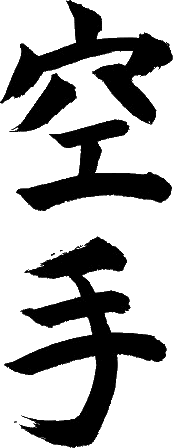Basic Terminology
A karateka who has learned the Japanese karate terminology is able to enter any karate dojo in the world and participate.
Many Japanese letters sound the same as they do in English, but some letters are pronounced or written differently. To learn the Japanese sounds of these letters, study the following chart.
| Japanese sound | English sound | Example |
|---|---|---|
| a | ah | aka (ah-ka) |
| ai | i | Shotokai (as in eye) |
| e | eh | hajime (as in let) |
| ei | ay | Sensei (as in day) |
| i | ee | Obi(oh-bee) |
| o | oh | dojo (doh-joh) |
| oi | oy | kiiroi (key-roy) (as in boy) |
| u | oo | uchi (oo-chee) |

In Japanese, the letter “r” is never emphasized. It is pronounced like a soft “d”. The letter “g” is always pronounced like the “g” in go.
Terminology Index
- General Terms
- Dachi Waza (stances)
- Uke Waza (blocks)
- Geri Waza (kicks)
- Tsuki Waza (punches)
- Counting
| Block | Meaning |
|---|---|
| Age uke | Rising block |
| Gedan uke | Down block |
| Soto ude uke | Outside forearm block |
| Uchi ude uke | Inside forearm block |
| Shuto uke | Knife block |
| Count | Meaning |
|---|---|
| Ichi | One |
| Ni | Two |
| San | Three |
| Shi | Four |
| Go | Five |
| Roku | Six |
| Shichi | Seven |
| Hachi | Eight |
| Ku | Nine |
| Ju | Ten |
| NiJu | Twenty |
| NiJu-Go | Twenty-five |
| Hyaku | One Hundred |
| Ippon | First |
| Yon | Fourth |
| Gohon | Fifth |